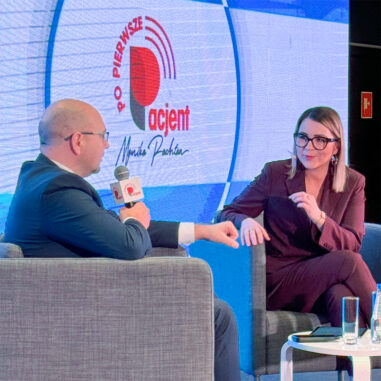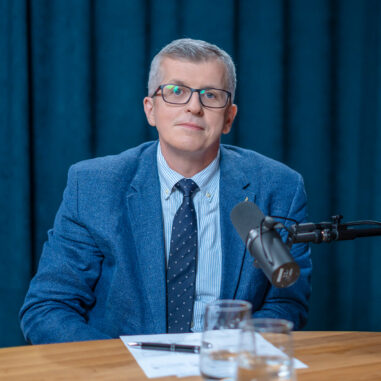
Who is the coordinator and how does she help a cancer patient. Episode 42
At a time when oncology care is being challenged by an increasing number of cancer cases, it is not only advanced treatment that plays a key role, but the appropriate guidance and emotional support of patients. In the latest episode of the programme 'Po pierwsze Pacjent', Monika Rachtan talks to Ewa Mikosik and Justyna Płatosz, oncology treatment coordinators from the Lower Silesian Centre for Oncology, Pulmonology and Haematology. They reveal the secrets of their work, pointing out the importance of empathy, professionalism and medical knowledge in building relationships with patients. Their stories highlight how important the role of the coordinator is in the fight against cancer, who becomes a bridge between the patient and the complex medical world, offering not only care but also a sense of security at every stage of treatment.
Lower Silesian Centre of Pulmonology and Haematology Oncology
The Lower Silesian Oncology Centre, now expanded to include Pulmonology and Haematology, is an institution that has been on the front line of the fight against cancer for years, offering patients not only modern treatment methods, but also psychological and organisational support. Specialising in a broad spectrum of oncological therapies, the Centre sets the standard in cancer diagnosis and therapy, paying particular attention to a personalised approach to each patient.
A revolutionary step that distinguishes the Lower Silesian Oncology Centre from other facilities in Poland was the introduction of the position of oncology treatment coordinator. At present, there are 36 oncology treatment coordinators, each taking care of 200 patients. This initiative has enabled patients to move more smoothly through the complex process of diagnosis and treatment, offering them a permanent point of contact and assistance in organising their treatment. As coordinator Iwona Mikosik emphasises, the introduction of this role was a response to the real needs of patients who, when faced with a cancer diagnosis, often feel lost and frightened.
One of the centre's most notable achievements is the launch of the Breast Cancer Unit, a specialised centre dedicated to the comprehensive fight against breast cancer. Its activities include not only running an early detection programme for this disease, but also advanced diagnostic and therapeutic methods, implemented as part of the so-called 'Oncology Package'.
Oncology treatment coordinator
On their way through the complexities of the healthcare system, oncology patients often face numerous challenges - from the moment of diagnosis, through the complex treatment process, to aftercare. In response to these needs, as part of the National Oncology Strategy and the National Oncology Network Act, the role of the oncology treatment coordinator has gained importance in the Polish healthcare system.
According to the National Oncology Network Act, a coordinator is a person whose role is to provide patients with information on the organisation of oncology diagnosis and treatment and to take the lead at the various stages of care. Ewa Mikosik, oncology treatment coordinator, highlights the essence of this role: "That's it in a nutshell, the coordinator is the person who will guide the patient through this oncological treatment pathway."
"The role of the coordinator is multidimensional. From the first days of diagnosis, the coordinator becomes the patient's guide through the complex treatment process. Patients receive support from the coordinator in organising the necessary examinations, consulting specialists and accessing therapies. The coordinator answers questions, dispels doubts and helps to manage the treatment plan, thus being an invaluable support during difficult times." - he adds.
Tasks of the coordinator:
- issuing oncology diagnosis and treatment cards;
- billing for services provided as part of diagnostics;
- Organisation of the consortium;
- initiating the implementation of the treatment plan;
- ongoing coordination of the treatment plan;
- transfer of oncology diagnosis and treatment cards to PCPs.
Before the coordinator function was introduced, many patients felt lost in the maze of the healthcare system. Often, they had to search on their own for information about available treatments, and the lack of clear guidelines could contribute to delays in treatment. Thanks to the coordinators, the process is now more structured and understandable to patients, which is crucial to the effectiveness of treatment and the wellbeing of patients
Emotional support
The role of the oncology treatment coordinator goes far beyond administrative tasks, becoming the foundation of emotional support for patients when faced with a diagnosis. As the coordinators from Wrocław emphasise, the key moment in the coordinator's work is the initial stage of the diagnosis, when the patient is faced with enormous fear and uncertainty. Coordinators then act as a stabilising point of support, soothing the first emotions and helping to build a sense of security.
Empathy is an indispensable element in building a relationship of trust. Patients, often confused and frightened, find in coordinators trusted people to whom they can turn for both emotional support and medical advice. The coordinators acknowledge that the job carries a heavy emotional burden and that maintaining professionalism requires them to be open-hearted and in control of their own feelings at the same time.
The episode's guests emphasise the importance of seeking a balance between empathy and professionalism, sharing ways to cope with the emotional strain. From physical activity to hobbies to psychological support, it all helps them to stay strong to help others. Additionally, training focused on patient communication and emotion management is an important part of their professional development, enabling them to even better support patients on their journey through cancer treatment.
Education
With the increasing demand for specialist oncology care, hospitals across the country are looking for coordinators to support patients during this difficult time. Such work is not only available to those with direct medical training.
There is a particular emphasis on social competence and empathy, indicating that oncology coordinators have a role far beyond traditional administrative duties. They are guides for patients through the labyrinth of medical procedures, while offering emotional support.
The interview highlighted how the professional experience of Ewa Mikosik and Justyna Płatosz, who both worked as nurses before becoming coordinators, made it significantly easier for them to understand patients' needs. As one of the coordinators emphasised, "Having medical knowledge, knowing what to answer to the patient, what to remedy, I feel freer and the patient feels safe, taken care of." Their medical background and direct experience of working with patients proved to be an invaluable asset in the effective fulfilment of the coordinator's duties.
Furthermore, they stress that the job of coordinator requires not only knowledge and interpersonal skills, but also adaptability and continuous learning. The opportunity to work in such a rapidly changing environment as oncology care attracts both those with medical experience and those who want to contribute to improving the quality of life of patients by using their communication skills and empathy.
The Patient First programme is available on multiple platforms, including Spotify, Apple Podcasts and Google Podcasts.
Source
- National Cancer Strategy (NSO) - https://www.gov.pl/web/zdrowie/narodowa-strategia-onkologiczna-nso
- Medical Activities Act - https://orka.sejm.gov.pl/proc9.nsf/ustawy/2935_u.htm
- Assumed and actual functions of an oncology treatment coordinator in the Polish health care system - Aleksandra Kita, Institute of Sociology, University of Zielona Góra
- What was the role of the oncology treatment coordinator supposed to be, and how is it in reality? - Karolina Osowiecka, Monika Rucińska, Anna Andrzejczak
Transcription
Monika Rachtan:
Every year, more than 200 000 people in Poland find out that they have cancer. The oncology patient pathway is very difficult and for many people very stressful. However, in order to go through it more easily, quickly and efficiently, oncology treatment coordinators were introduced into the system. You are probably wondering what such a coordinator does. Well, that is what I am going to talk about today with the ladies coordinators who came to me from the Lower Silesian Centre of Pulmonology and Haematology Oncology. With us is Mrs Ewa Mikosik. Good morning, Ewa.
Ewa Mikosik:
Good morning, madam.
Monika Rachtan:
And Mrs Justyna Płatosz. Good morning, Mrs Justyna.
Justyna Płatosz:
Good morning.
Monika Rachtan:
I am very pleased that you have accepted my invitation. Today we will try to answer our listeners who the oncology treatment coordinator can help, what he or she does and where he or she has his or her room on the ward. We will not talk about all rooms in Poland, but perhaps we will give you an idea of what it looks like at the Lower Silesian Pulmonology and Haematology Oncology Centre. I'm going to start with you, Justyna, and ask you how the work on introducing coordinators in the DCO started when it was still the Lower Silesian Oncology Centre, when you started working there as a coordinator.
Justyna Płatosz:
It was 2015 and I was working in the radiotherapy department as a treatment nurse. I received an offer from the headmistress to try to do something new, namely to become an oncology treatment coordinator. At that time, there was still no talk of details. I didn't know whether I would be taking care of breast cancer patients or other areas.
Monika Rachtan:
Did you even know what you would be doing? Because the name 'oncology treatment coordinator' might not have been very telling. On the one hand, you were in the radiotherapy department, so you were dealing with irradiated patients. Now something completely different.
Justyna Płatosz:
Something completely new, a lot of administrative work. The beginnings were very surprising. We didn't have our own room or computers, so we started in a corner of some office. We were building a team from scratch. We got to know each other and gradually shaped our work.
Monika Rachtan:
But when you come up with a new position, you probably need to establish some framework at the beginning, right? What will this person do? Oncology treatment coordinator goes on to sound quite generic. You had to structure your own work. Did someone come in and tell you what to do, or did the experience of the team allow you to determine on your own those needs that were unattended to at the time?
Ewa Mikosik:
We, the three breast cancer coordinators, created our tasks ourselves, based on the needs of the patients. We had no role models or examples to follow. In Poland, this was all just developing. We were the first centre with coordinators. We had a lot of support from the head lady, the supervisor and Professor Matkowski, who introduced us to our tasks. It was a process of trial and error, feedback from others. We had no role models, everything was created step by step by us.
Monika Rachtan:
So this essay is over and now we can summarise what the coordinator does. Ms Eve, what does your job look like on a day-to-day basis?
Ewa Mikosik:
In the nutshell, the coordinator guides the patient through the entire cancer treatment pathway, from diagnosis onwards. When a patient receives a cancer diagnosis, anxiety and fear dominate. Our job is to negate this fear so that the patient feels safe and cared for. Many times patients do not even want to confide in their family.
Monika Rachtan:
That they suffer from cancer.
Ewa Mikosik:
So they cannot rely on family support. We are the closest people to them, as far as possible within our competence. If we see a bigger emotional problem, we refer the patient to a psychologist. Thanks to our medical training, patients can turn to us with various medical problems.
Monika Rachtan:
I understand, and now I will ask from the patient's point of view. A patient receives a DILO card, goes to a cancer centre. At what point does he meet you? Is there registration first, filling in the paperwork, and then he goes straight to the coordinator? Does he first go to the doctor and then to you? How is this organised?
Ewa Mikosik:
Initially, with the DILO card, the patient goes to the doctor's surgery, where diagnostics begins on the basis of this card. Mammograms and ultrasound examinations are performed, if needed. On the basis of these tests, the patient is qualified for a biopsy or not. After the result of the biopsy, if cancer is found, the patient is transferred to our care, i.e. to the coordinator.
Monika Rachtan:
So at this most difficult moment, yes?
Ewa Mikosik:
Yes, at the most difficult moment our role begins. Covering the patient with holistic care.
Monika Rachtan:
And Mrs Justina, those moments when patients meet you for the first time, on receiving a cancer diagnosis, are these difficult moments for patients? And what is it like for you after so many years of working?
Justyna Płatosz:
Every patient's story is different and it all depends on the individual approach, the emotions, the age of the patient. Everyone reacts differently to the disease. There are patients who accept the diagnosis calmly, treating it as another stage of life. There are also those who react aggressively, unable to accept their situation. Some patients, after receiving the results, do not return. There are also young people who give up on treatment, opting for alternative methods.
Ewa Mikosik:
I will interject that it is our job to convince the patient to take treatment, especially when we see a young person who does not opt for standard methods.
Monika Rachtan:
This is very worrying. The ladies work in a very specific department where patients' stories are particularly difficult. How do you deal with the emotions that accompany such work?
Justyna Płatosz:
Each of us copes differently. Some of us read books, others play sports, have hobbies like gardening or walking in the mountains. We have learned to deal with our emotions over the years. We have many years of experience, we have worked in different wards, we have met with seriously ill patients. This experience has allowed us to find ways of dealing with the emotions that accompany our work.
Monika Rachtan:
That is, you could say that it's not about becoming immune, but about finding ways to deal with these emotions.
Justyna Płatosz:
Yes, it's not about immunisation. We really live these stories with the patients, but we try to find a way to be able to continue to help others.
Monika Rachtan:
But, after all, as professionals, you have to convey strength to the patient and you cannot show your emotions, can you?
Ewa Mikosik:
Yes, we have to give the patient the feeling that they can rely on us, that we are the person who will help them. We cannot show our emotions, the patient cannot see them in us.
Justyna Płatosz:
Although at times ...
Ewa Mikosik:
Occasionally a tear will be shed.
Justyna Płatosz:
Yes, a tear will well up.
Ewa Mikosik:
There are all sorts of situations, so tears do come. But then we take three deep breaths. It's a difficult thing to do. That's why, as I say, sometimes we share these emotions, we talk. We are also helped by the classes that a psychologist teaches, teaching how to talk to the patient and how to deal with emotions. This is very important for us.
Monika Rachtan:
This is very important.
Monika Rachtan:
I would like to return to the issue of opting out of treatment. I would like to appeal to our listeners, but also to the men who are often the support for women on this difficult treatment path, that there are many treatment options in Poland. Breast cancer can often be cured almost completely, even if it is an advanced tumour. So it's worth checking in with a coordinator and learning about treatment options. I also recommend the episode with Dr Kasia Pogoda, where we discuss breast cancer treatment. But back to the coordinator, Ms Eve, what does a coordinator's working day look like?
Ewa Mikosik:
The day starts with checking messages on the service phone. We respond to patients' messages so that they feel looked after. We then divide up the tasks: one of us receives new patients, others attend consiliums, another answers the phones. We are available to patients at every stage of treatment, although we cannot be available 24 hours a day. But whenever we are at work, someone is available at the surgery.
Monika Rachtan:
So at the beginning, when a patient gets a diagnosis, they are given a slip of paper with a telephone number for the coordinator?
Justyna Płatosz:
Yes, he gets a list of tests to be done, a contact number, and the coordinator makes all the appointments.
Monika Rachtan:
That is, the patient leaves with everything taken care of. He does not have to do anything on his own.
Justyna Płatosz:
Exactly. Everything is scheduled, so the patient just does the tests and comes to the appointments. He doesn't have to make any appointments for any tests himself.
Monika Rachtan:
That is, you are open to change and innovation. This is very important, especially in such a rapidly changing environment as medicine and patient care. And it shows how important it is to adapt to new situations, but also to listen to patients and team members. My question now is more about the future. What developments do you see for the role of the patient coordinator in Poland? Are there any special skills or qualifications that will be increasingly in demand for this role?
Ewa Mikosik:
Certainly, the development of technology and the digitisation of healthcare services will have a big impact on our work. We are already seeing the importance of access to electronic medical records and how this facilitates communication with patients and within the team. We will also have to adapt to new telemedicine tools that allow remote monitoring of patients' conditions and online consultations.
Justyna Płatosz:
In addition, communication skills and empathy will always be at a premium, but I think we will need to pay more and more attention to gaining knowledge of psychology in order to support patients even better in difficult moments. Also, the ability to work in an international environment may become important as more and more patients seek treatment abroad or use international treatment protocols.
Monika Rachtan:
This shows how the role of the patient coordinator is evolving and how important it is to continuously improve in this field. Are there any specific training programmes or certifications that you recommend for those looking to develop in this role?
Ewa Mikosik:
There are several training programmes specifically aimed at healthcare coordinators that cover both the medical and psychological aspects of patient care. It is important to look for ones that are accredited by relevant public health or educational institutions.
Justyna Płatosz:
I also strongly recommend courses in medical communication, stress management and courses in the use of modern information technology used in medicine. It is also a good idea to keep up to date with professional literature and attend industry conferences, which are an excellent opportunity to exchange experiences and expand your knowledge.
Monika Rachtan:
I understand that due to the continuing advances in breast cancer treatment, ongoing staff education is required, especially when new drug programmes are introduced. Eve, are there times when you have to spend nights reviewing new information?
Ewa Mikosik:
Fortunately, we have systematic training sessions that the Professor has organised for us. They take place at times that are convenient for us, which is very beneficial. Thanks to these trainings, we learn a lot of new things and are eager to participate.
Monika Rachtan:
Yes, well-prepared staff are all about patient safety. And what questions do you most often answer for patients when you check your phones in the morning?
Justyna Płatosz:
Sometimes the questions seem trivial to us, but we understand that they are important to the patient. Most often they ask if they are sure they are registered for a particular appointment. Patients being treated with chemotherapy ask about possible side effects. We are the first link they can turn to with questions about side effects of treatment.
Monika Rachtan:
And if an oncology patient asks about taking NSAIDs for a headache, is that a question for the coordinator?
Ewa Mikosik:
Yes, this is a question for the coordinator. If the headache is legitimate, the patient can confidently take something analgesic. There is no need to go immediately to an oncologist for oncological treatment.
Monika Rachtan:
What about a patient being treated with tablets for cancer who asks if she can fly a plane?
Justyna Płatosz:
Of course, it can fly. However, remember to take your medication with you. If anticoagulants are indicated, it is up to the doctor to decide, but in general there is no contraindication to flying in such a situation. It is important that the patient has their medical card with them.
Monika Rachtan:
It's great that we're talking about this because it's about real patient problems. It used to be that these kinds of questions were more likely to come from the oncologist's office, and now you, as coordinators, are a real support. You can answer worrying questions or support in making good decisions about rest or relaxation. This is very valuable. Eve, could you compare the life of a patient before the arrival of coordinators in the oncology wards at the DCO in 2015 and now? What are the benefits for the patient if you had to describe it in print?
Ewa Mikosik:
The patient experiences a significant benefit from the speed of diagnosis and its timeliness. He does not have to worry about deadlines, as it is our role to keep them as short as possible. We have four weeks to complete the primary diagnosis and three weeks for the in-depth diagnosis. It is our job to organise this to fit within these deadlines.
Monika Rachtan:
Justyna, and how many patients do you have under your care?
Justyna Płatosz:
It is difficult to say the exact number, but since 2015 I have been caring for about 1300-1400 patients. Currently, those actively needing my help are about 200, maybe a little more.
Ewa Mikosik:
This is the number of active patients who are undergoing treatment.
Justyna Płatosz:
Yes, during surgical or systemic treatment, during radiotherapy. There is usually a period of one to two years when the patient is under our care. But there are also patients on long-term systemic treatment, even five or ten years, who also contact us. We are not limited to the end of treatment, such as radiotherapy. Especially elderly people, often alone, who need our help can count on us.
Monika Rachtan:
Now, for example, when you go home, will you still take calls from patients?
Justyna Płatosz:
No, we didn't take our work phones with us today. But there are three coordinators left in the office who will definitely answer the call. If the patient does not reach the mobile phone, there are still two landlines available.
Monika Rachtan:
Does the coordinator work at weekends?
Justyna Płatosz:
No.
Monika Rachtan:
So if there are problems at the weekend, should the patient use night care?
Justyna Płatosz:
Yes, from night care.
Monika Rachtan:
I understand that patients are given this information to feel protected for the weekend.
Justyna Płatosz:
Yes, every patient is informed that we work Monday to Friday from 7am to 3pm and weekends are free.
Monika Rachtan:
How does medical training help you in your work as a coordinator?
Ewa Mikosik:
This helps a lot, as we are able to answer most of the patients' questions about their symptoms during treatment. Often patients ask us about the prescribed medication and what they can expect from it. This allows us to educate patients and often their families as well. For example, if a patient's daughter has never had a mammogram, we encourage her to do so by pointing out the appropriate age range and the need for the test.
Monika Rachtan:
So you are somewhat fulfilling the role of a primary care physician who should inform about prevention?
Ewa Mikosik:
Exactly, we encourage and inform patients.
Monika Rachtan:
And when it comes to preventive examinations, do you regularly have mammograms, breast ultrasounds?
Ewa Mikosik:
Yes, we perform them regularly.
Monika Rachtan:
Observing the day-to-day work in your department, do you feel more pressure to carry out such research?
Ewa Mikosik:
Definitely yes. We are aware of the need and encourage all women to have regular mammograms and breast ultrasounds.
Monika Rachtan:
Let me remind you that such examinations are reimbursed in Poland. Mammography is available as part of a preventive screening programme for women up to the age of 74. They are readily available even in smaller towns, not only in large cities. This examination can save lives.
Ewa Mikosik:
Yes, many times.
Monika Rachtan:
The job of a coordinator requires a lot of empathy. Professor Piotr Rutkowski, co-founder of the national oncology network, spoke of empathy as one of the key qualities of a coordinator, alongside medical education. Do you agree that this is an essential quality in your work?
Ewa Mikosik:
We agree without a doubt.
Monika Rachtan:
How does empathy help you in your daily work?
Ewa Mikosik:
It allows us to better understand the patient's situation. I wonder what I would expect if I were in the patient's shoes. Patients often share different stories with us, needing support and advice.
Monika Rachtan:
This is a huge support. We talked about how important it is to be able to put yourself in the patient's shoes. I always try to think about patients' problems and communicate that information. In my programme I emphasise that there are no stupid questions, there are only questions that patients are looking for answers to. Our job is to provide those answers and educate. If you were to advise young people who would like to become coordinators, what prerequisites do you have to meet and what qualities are important besides empathy and medical education?
Justyna Płatosz:
I think medical knowledge and experience is important. It's experience that has allowed us to go through the hard way and get to where we are. It helps us in our daily work.
Ewa Mikosik:
Having medical knowledge makes it easier for us to answer patients' questions and deal with different situations. This makes patients feel safe and properly cared for.
Monika Rachtan:
Do you happen not to know what to answer the patient?
Ewa Mikosik:
If, that is, I mean yes, I still try to make sure the patient doesn't notice it. If I encounter a problem that I am not sure how to solve, I consult a colleague or ask the doctor.
Monika Rachtan:
So your work also requires teamwork, because it is important for coordinators, nurses, nurse practitioners and doctors to work together. Are doctors open to working with coordinators?
Ewa Mikosik:
Of course. We are part of a team that includes secretaries, nurses and doctors. We work together, sharing the task and support as needed.
Monika Rachtan:
Today we are speaking at a very special forum of the Institute for Patients' Rights and Health Education, which looks after the welfare of patients. Today's episode is special because we are close to patients and patient organisations. The Institute is paying attention to the humanisation of medicine. Eve, what does the humanisation of medicine mean to you?
Ewa Mikosik:
To me, this means a holistic approach to the patient, one in which the patient feels cared for and has fewer concerns.
Monika Rachtan:
And for you, Justyna?
Justyna Płatosz:
For me, it's respect for the patient and family, responsibility and empathy. These are key values.
Previous episodes
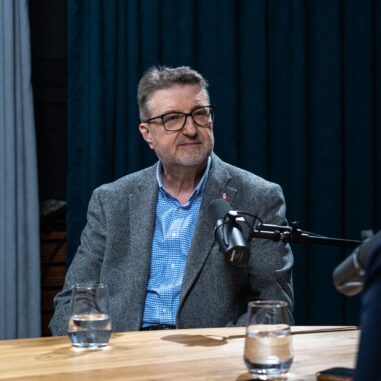
Bariatric surgery or how gastric reduction combats obesity. Episode 41
Bariatric surgery is a key solution for people struggling with obesity for whom other treatments have proved ineffective
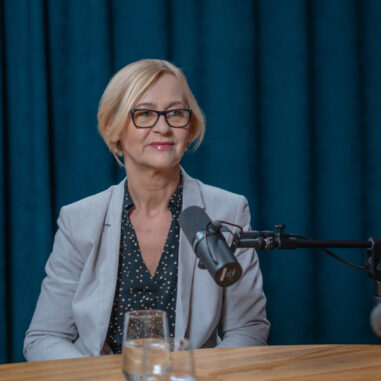
You are not alone! A common way through cancer thanks to foundations like OnkoCafe. Episode 40
The talk sheds light on how the oncology side of healthcare in Poland has changed over the years
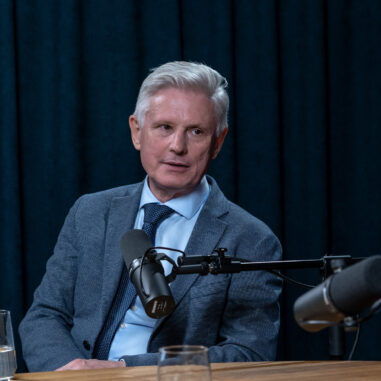
Urinary incontinence - more than a medical problem. Episode 39
Urinary incontinence, although often seen as a strictly medical problem, also has a profound social dimension
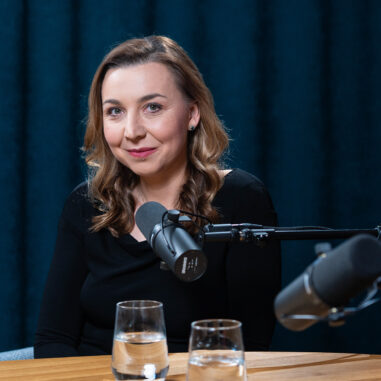
SLA - the diagnosis no one wants to hear. Episode 38
Amyotrophic lateral sclerosis (SLA), also known as Lou Gehrig's disease, is a serious and rare condition that attacks motor neurons in the brain and spinal cord


